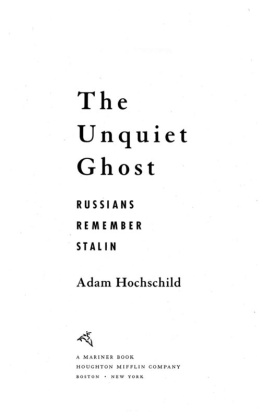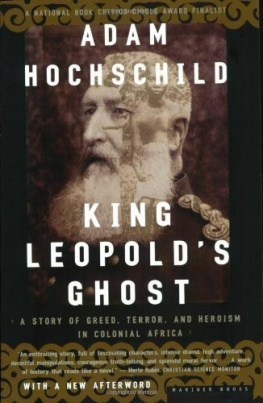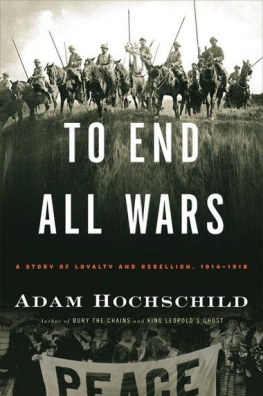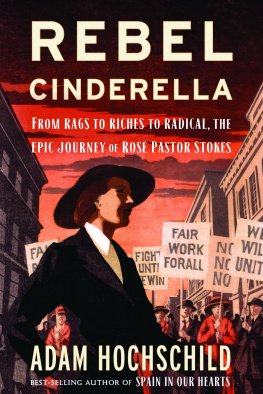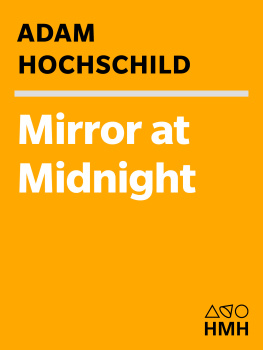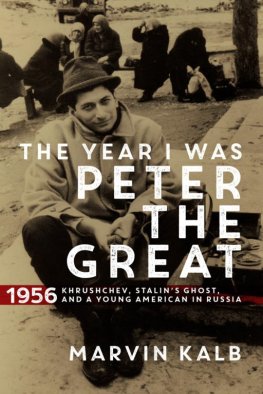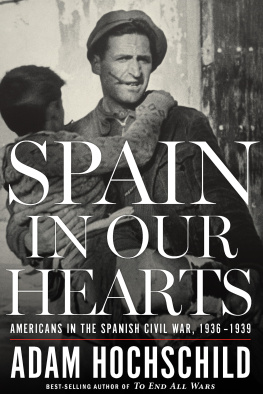Adam Hochschild - The Unquiet Ghost: Russians Remember Stalin
Here you can read online Adam Hochschild - The Unquiet Ghost: Russians Remember Stalin full text of the book (entire story) in english for free. Download pdf and epub, get meaning, cover and reviews about this ebook. year: 2003, publisher: Mariner Books, genre: Politics. Description of the work, (preface) as well as reviews are available. Best literature library LitArk.com created for fans of good reading and offers a wide selection of genres:
Romance novel
Science fiction
Adventure
Detective
Science
History
Home and family
Prose
Art
Politics
Computer
Non-fiction
Religion
Business
Children
Humor
Choose a favorite category and find really read worthwhile books. Enjoy immersion in the world of imagination, feel the emotions of the characters or learn something new for yourself, make an fascinating discovery.
- Book:The Unquiet Ghost: Russians Remember Stalin
- Author:
- Publisher:Mariner Books
- Genre:
- Year:2003
- Rating:4 / 5
- Favourites:Add to favourites
- Your mark:
- 80
- 1
- 2
- 3
- 4
- 5
The Unquiet Ghost: Russians Remember Stalin: summary, description and annotation
We offer to read an annotation, description, summary or preface (depends on what the author of the book "The Unquiet Ghost: Russians Remember Stalin" wrote himself). If you haven't found the necessary information about the book — write in the comments, we will try to find it.
The Unquiet Ghost: Russians Remember Stalin — read online for free the complete book (whole text) full work
Below is the text of the book, divided by pages. System saving the place of the last page read, allows you to conveniently read the book "The Unquiet Ghost: Russians Remember Stalin" online for free, without having to search again every time where you left off. Put a bookmark, and you can go to the page where you finished reading at any time.
Font size:
Interval:
Bookmark:
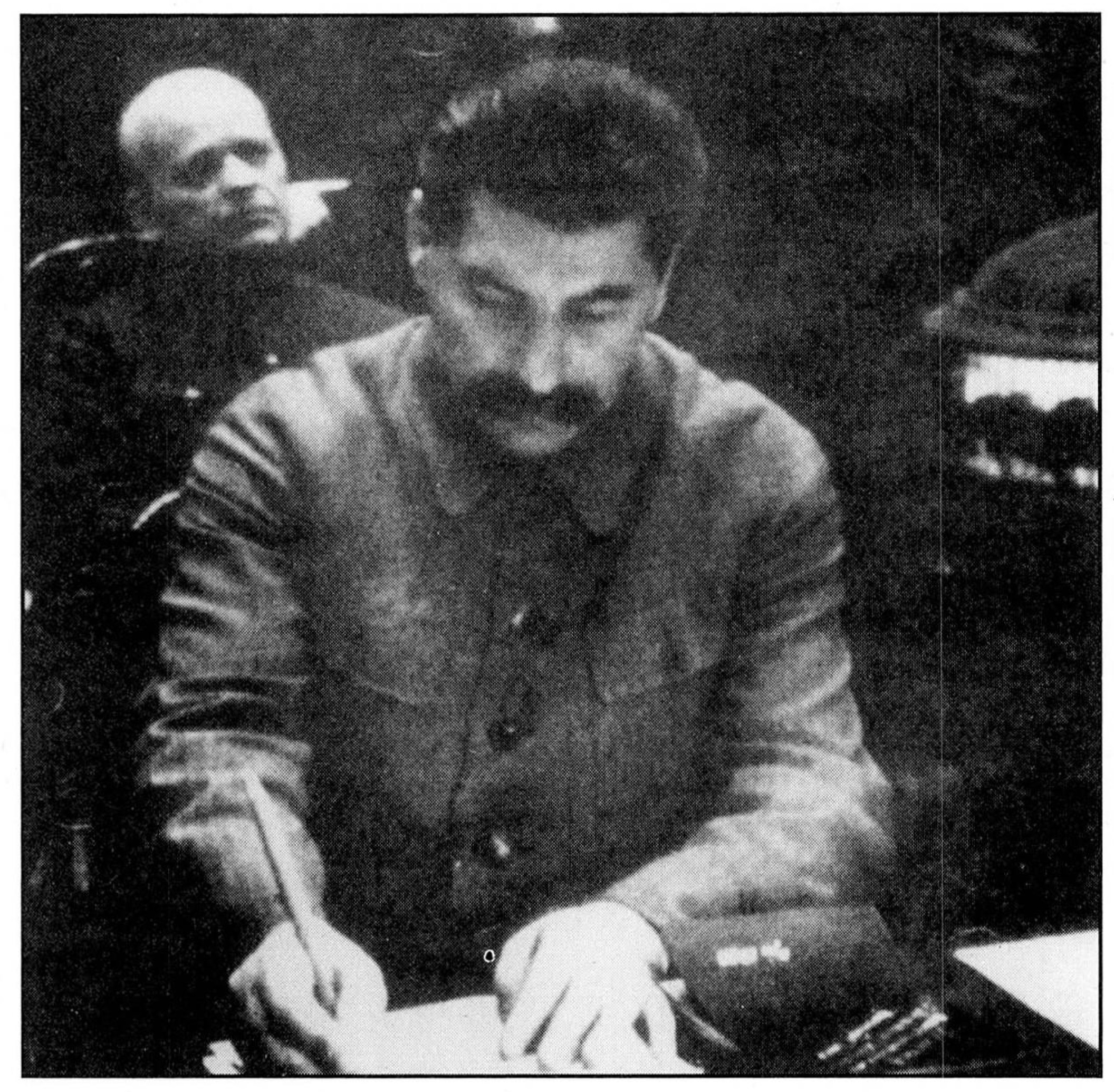
A MARINER BOOK
HOUGHTON MIFFLIN COMPANY
BOSTON NEW YORK
First Mariner Books edition 2003
Preface copyright 2003 by Adam Hochschild
Copyright 1994 by Adam Hochschild
All rights reserved
For information about permission to reproduce selections from this book,
write to Permissions, Houghton Mifflin Company, 215 Park Avenue South,
New York, New York 10003.
Visit our Web site: www.houghtonmifflinbooks.com.
Library of Congress Cataloging-in-Publication Data is available.
ISBN 0-618-25747-0 (pbk.)
ISBN 978-0-618-25747-8
Printed in the United States of America
DOC 10 9 8 7 6 5 4
Portions of this book first appeared, in somewhat different form, in the Los Angeles Times,
Mother Jones, the New York Times Magazine, In These Times, and West magazine.
Grateful acknowledgment is made for permission to reprint excerpts from the following
copyrighted works: "Destruction" by Nikolai Kluyev, trans, by Richard McKane, appear
ing in Index on Censorship. Reprinted by permission of Index on Censorship, London.
"History of Russia" from Resistance by Victor Serge, trans, by James Brook. Copyright
1989 by James Brook. Reprinted by permission of City Lights Books. Hope Against
Hope by Nadezhda Mandelstam, trans, by Max Hayward. Copyright 1970 by Athe
neum Publishers. Reprinted with the permission of Atheneum Publishers, an imprint of
Macmillan Publishing Company. Hope Abandoned by Nadezhda Mandelstam, trans, by
Max Hayward. Copyright 1973, 1974 by Atheneum Publishers. Reprinted with the
permission of Atheneum Publishers, an imprint of Macmillan Publishing Company.
Journey into the Whirlwind by Eugenia Semyonovna Ginzburg, trans, by Paul Stevenson
and Max Hayward. Copyright 1967 by Arnoldo Mondadori Editore, Milan. English
translation copyright 1967 by Harcourt Brace & Company. Reprinted by permission
of Harcourt Brace & Company. Within the Whirlwind by Eugenia Ginzburg. Copyright
1979 by Arnoldo Mondadori Editore, S.p.A., Milan. English translation copyright
1981 by Harcourt Brace & Company and William Collins Sons & Co., Ltd. Reprinted by
permission of Harcourt Brace & Company.
Photograph credits: frontispiece, xvi, 93, 287, David King Collection; I, UPI/Bett
mann; 41, courtesy of Sergei Krasilnikov; 99, 134, 214, 225, Ellen Binder; 157, Adam
Hochschild; 195, Russian Pictorial Collection, Hoover Institution Archives; 233, Thomas
Sgovio Collection/Hoover Institution
Frontispiece photograph: Stalin in 1933, said to be signing a death sentence
For Janusz Bardach (19192002)
Preface
Chart: Major Events in 20th-century Russian and Soviet History
Introduction: The Great Silence
Map
MOSCOW I
1. Father and Son
2. The Uses of Memory
3. To See Things As They Are
SIBERIA I
4. "Why Are We Weeping?"
5. Lunch with the Colonel
6. Souls Living and Dead
MOSCOW II
7. Believers
8. "The Stalin in Us"
9. Beyond Black and White
11. "The Interrogation Has Been Interrupted"
12. Library of Death
13. An Empty Field
SIBERIA II
14. Secrets of the Riverbank
15. Two Fathers, Two Daughters
16. Shark and Angel
THE DARK SIDE OF THE MOON
17. Beyond the Pole Star
18. The Inmost Circle
19. The Power of Facing Unpleasant Facts
20. Port of Arrival
Bibliography and Acknowledgments
Index
A few days after arriving in Moscow to begin the research for this book, I trudged through the snow to go shopping at a grocery store near our rented apartment. An older man with a lined, thoughtful face seemed to have the job of stocking the shelveseasy work, because there was not much food. He was sitting in a chair at the end of a deserted aisle reading Varlam Shalamov, the great short story writer of the gulag. "I've read that same book in English," I told him. We agreed that Shalamov was a great writer. "And it's important," the man said with much feeling, "that these things be documented, by someone who speaks with the authority of having been there." Probably, like so many millions of other Russians, he had seen someone from his own family vanish into the wintry darkness of the Siberian labor camps.
The Russia where I had come to live, in 1991, was then a country where only in the previous few years had it become possible to read those long-forbidden books at last, to look the past in the face, and to ask the question that obsessed Russians as much as it did me: How could the country that gave the world Tolstoy and Chekhov also give it the gulag? Everywhere I went, it seemed, people were thinking about this. In addition to the men and women I sought out to interview, I kept stumbling into other unplanned conversations about Russia's Stalinist past, from the one in that grocery store to one recounted in the following pages, which had to be carried on in shouts, above the roar of jet engines, in a helicopter's cockpit.
It is now more than a decade since I spent half a year in Russia, first in Moscow and then traveling all the way to the country's Pacific coast, finding the people whose voices are heard here. After I returned home, friends often asked me, Wasn't it depressing to live there for so many months, studying the blood-soaked Stalin years? But it was not. On the contrary, horrible as that era was, this made it all the more inspiring to spend time with people who were bravely seeking to grapple with that dark time, to understand it deeply, to remember all that the authorities had wanted forgottenand to try to make sure, by means of that remembering, that history does not repeat itself.
I hope you will find it as moving as I did to meet the people in this book: veterans of the gulag, men and women whose parents are buried in mass graves, a daughter struggling to reconcile her love for her father with the hundreds of death warrants he signed, two most unusual former secret policemen, and a woman who, as a teenager half a century ago, had courage matched by no adult around her.
Like the characters in the great nineteenth-century Russian novels, I found many of these people larger than lifeor at least grappling with moral issues that seemed larger than those that confront most of us in the West. Few of us ever face the choice of whether to testify against a friend or neighbor or be shot ourselves. And few of us today have to judge a parent or grandparent who made such a decision. Yet these issues are all too familiar in too many parts of the world. Since this book was written, Rwanda and the former Yugoslavia have erupted in horrendous mass murder, where often it was friends and neighbors who did the killing or who passively stood by. The questions raised by human behavior in Stalin's Soviet Union still face us in the twenty-first century.
All Russians struggling to come to grips with the Stalin era know what Thomas Hardy meant when he wrote that "if way to the Better there be, it exacts a full look at the Worst." It was wanting to see just how people in Russia were taking that full look that took me there. I was extremely lucky, I realize now, to have gone when I did. A half decade earlier, the lid was screwed on tight and even the most oblique "look at the Worst" was impossible. No ideas, no history, no writers outside the gray Communist Party orthodoxy could be read or talked about in public. By a year or two after my stay in the Soviet Union during its final year as one country, people still enjoyed the freedom to explore the past, but were overwhelmed by the collapse of the economy, official corruption, and the shocking rise in organized crime. It is hard to focus on injustice in the past when you've lost your job and someone has just been murdered on the street outside.
Next pageFont size:
Interval:
Bookmark:
Similar books «The Unquiet Ghost: Russians Remember Stalin»
Look at similar books to The Unquiet Ghost: Russians Remember Stalin. We have selected literature similar in name and meaning in the hope of providing readers with more options to find new, interesting, not yet read works.
Discussion, reviews of the book The Unquiet Ghost: Russians Remember Stalin and just readers' own opinions. Leave your comments, write what you think about the work, its meaning or the main characters. Specify what exactly you liked and what you didn't like, and why you think so.

